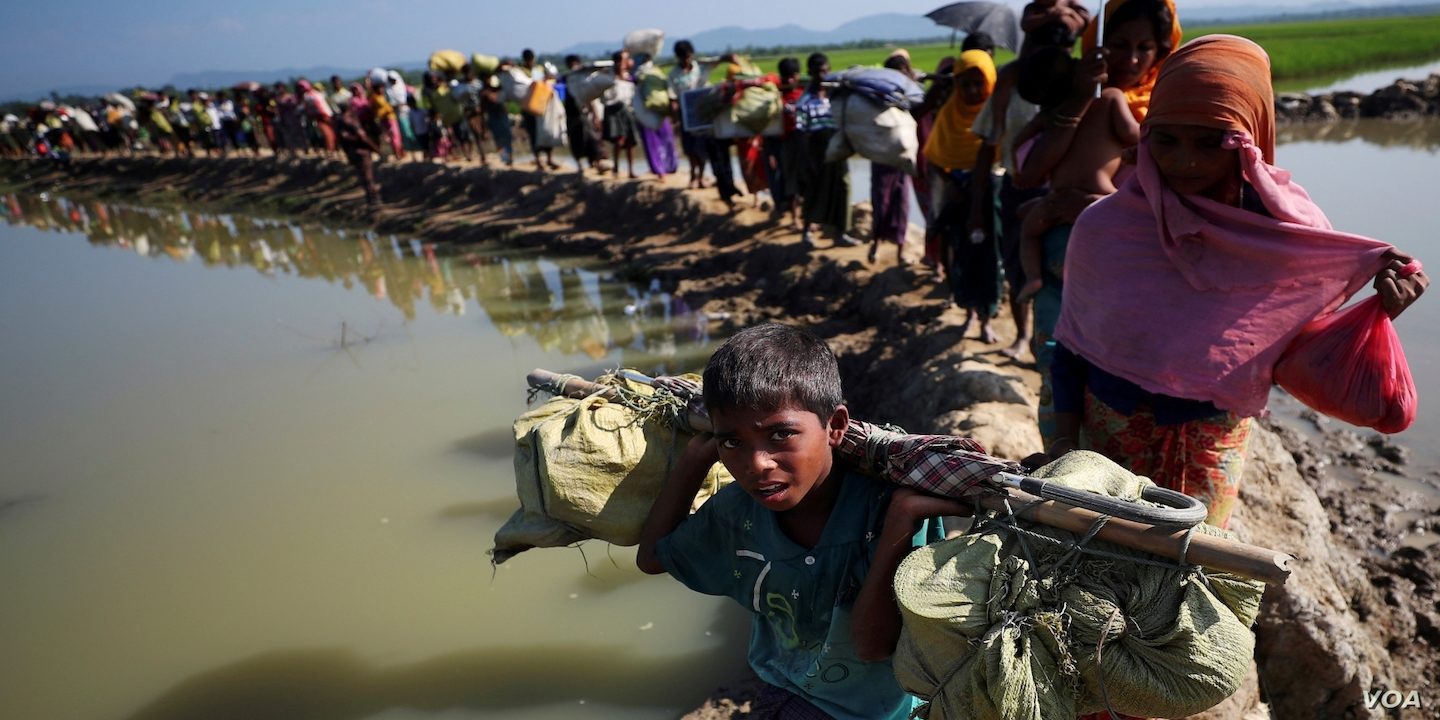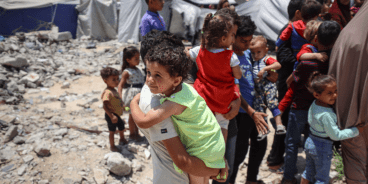

Statement in Solidarity and Support of the Rohingya Community: The Need for Justice and Accountability, 25 August 2020

The following statement was published by the Asia Justice Coalition of which the Global Centre for the Responsibility to Protect is a member.
Three years after the Myanmar military launched its campaign involving acts amounting to crimes against humanity and acts the UN’s Fact-Finding Mission determined may amount to genocide against its Rohingya Muslim citizens, the Asia Justice Coalition today joins the Rohingya community in remembering and honouring their victims and survivors. Over a million Rohingya remain refugees, most of them in Bangladesh, but also scattered in other countries including Malaysia, India, Thailand, Indonesia and in Europe. Some 126,000 individuals have also been internally displaced and are living in dire conditions.
We reflect on the need for justice for the Rohingya, including through investigations and prosecutions of those individually responsible for crimes under international law committed against the Rohingya, and to uphold their right to safe, dignified and voluntary return. We recognize the global efforts undertaken so far, and encourage further action to ensure truth, justice, and reparations for the Rohingya.
I. Background
The Rohingya have been subjected to widespread gross human rights violations and serious violations of international humanitarian law. The United Nations appointed Independent International Fact-Finding Mission (FFM) has established the facts and circumstances of human rights violations by military and security forces in Myanmar. According to the FFM, many of these violations undoubtedly amount to serious crimes under international law, including crimes against humanity and likely genocide. The FFM identified widespread human rights and humanitarian law violations, including but not limited to arbitrary detention, torture and inhuman treatment, rape and other forms of sexual violence, extrajudicial, summary or arbitrary killings, enforced disappearances, forced displacement and unlawful destruction of property. The military has systematically used sexual violence as a weapon of war, with the gang-rape of women and girls, as well as violations against men and members of the transgender community coming to light. They have burned down villages, killed children and maintained a long-standing pattern of violations and abuses, systemic discrimination and policies of exclusion and marginalization against the Rohingya.
It is estimated that over a million Rohingya have been forced to flee their homes, to seek refuge in other countries. The Rohingya have continued to undertake dangerous journeys on boats to neighbouring countries and many have been subjected to trafficking, whilst some have been separated from their families and many have lost their lives at sea. There have been numerous cases this year where Rohingya making these perilous journeys have been ‘pushed back’ at sea and denied permission to disembark in Malaysia and Thailand, in clear violation of international law.
Justice for the Rohingya has been denied in Myanmar. The Myanmar government has claimed that those who have perpetrated these heinous crimes against the Rohingya will be held accountable through criminal prosecution. However, there has been near-total impunity for those responsible. In the rare instance of the prosecution and sentencing of seven soldiers for killing ten Rohingya men and boys in Inn Din village, those convicted were pardoned after serving less than a year of their ten-year sentence, which was handed down following closed proceedings in a military tribunal, inconsistent with international law and standards. This directly contradicts the Myanmar government’s claims that it will meet its obligations to bring those individually responsible for crimes under international law to justice.
There is a culture of impunity for perpetrators of gross human rights violations. The courts-martial process in Myanmar is an example of the government’s standard position of ‘defend, deny and dismiss’ with many perpetrators walking free, without facing criminal prosecution. The Myanmar justice system and the Myanmar National Human Rights Commission (MNHRC) are currently unable and unwilling to pursue accountability for gross human rights violations. Similarly, the Independent Commission of Enquiry established in 2018 has been compromised from the outset. The justice system therefore requires wide-ranging reform – including through amendments to the constitution – to guarantee its independence and impartiality, so it can effectively promote and protect human rights in Myanmar. The enormity of this task, and the lack of political will to see it through, cement consensus that justice can only be achieved through international justice processes.
II. International Justice Initiatives
The past year has seen progress towards justice for the Rohingya. There have been significant developments at the International Criminal Court (ICC), the International Court of Justice (ICJ), as well as the commencement of work of the Independent Investigative Mechanism for Myanmar (IIMM).
At the ICC, following authorization by Pre-Trial Chamber III, the Prosecutor has opened an investigation into crimes related to the forced deportation of Rohingya from Rakhine State in Myanmar, (which is not party to the Rome Statute of the ICC), across the border into Bangladesh, which has ratified the Rome Statute.
In November 2019, the Republic of The Gambia filed a case before the International Court of Justice alleging that Myanmar’s atrocities against the Rohingya violate the Convention on the Prevention and Punishment of the Crime of Genocide (Genocide Convention). On 23 January 2020, the ICJ in a unanimous decision, issued an order granting the indication of provisional measures. The Court ordered immediate measures to be taken by Myanmar, including that the State take all measures to prevent and ensure that the Myanmar military, as well as any irregular armed units desist from any acts that could form elements of the crime of genocide, or that could violate its obligations under the Genocide Convention.
The Independent Investigative Mechanism for Myanmar has also commenced its work, which is to “collect, consolidate, preserve and analyse evidence of the most serious international crimes and violations of international law committed in Myanmar since 2011”. The IIMM continues the work of the FFM, feeding into international justice efforts such as criminal investigations and prosecutions.
The success of these international justice initiatives is dependent on the mechanisms having the capacity to undertake their work, as well as the political support and cooperation of States, intergovernmental organizations, civil society organizations and other stakeholders in Myanmar and globally.
III. Call to Action
The Asia Justice Coalition notes that there are opportunities for all stakeholders to do more. We call upon the international community to redouble its efforts to pursue truth, justice, and reparations with and for the Rohingya.
We also reiterate the need for greater cooperation and support from the international community to international (and national) justice initiatives, in order that they may be fully engaged in the pursuit of justice for crimes under international law committed against the Rohingya:
- We urge the international community to continue to press the Myanmar government to meet its international law obligations, to bring those suspected of crimes under international law to justice through fair trials. We urge condemnation – in the strongest terms – of Myanmar’s failure to pursue justice for the Rohingya.
- We urge the United Nations Security Council to refer Myanmar to the International Criminal Court, which would allow the court to address allegations of the full range of Rome Statute crimes against the Rohingya and other ethnic minorities, including genocide, crimes against humanity and war crimes.
- We urge the Myanmar government and all actors to support and cooperate with the IIMM. We emphasise the need for meaningful engagement and information sharing for effective investigations and prosecutions of crimes under international law.
- We urge States and business enterprises to ensure compliance with the UN Guiding Principles on Business and Human Rights as a minimum, in any business activities related to Myanmar. The obligation to ensure activities do not cause or contribute to human rights violations falls on the State as well as business enterprises, and this is an area of particular concern in Myanmar.
- We urge the Myanmar government to guarantee to the Rohingya equality under the law relating to citizenship rights, as well as other core issues such as freedom of movement. The Rohingya should be equal parties in the development of these frameworks and must have the ability to return to Myanmar, in keeping with a voluntary, safe and dignified return, once the conditions are fulfilled.
- We highlight the need for the Myanmar government to recognise and respect the Rohingya’s voting rights in the upcoming elections on November 8. The voting rights of the Rohingya were stripped in 2015 through the 1982 law, which states that only ethnic nationalities whose families entered the country before 1823 are entitled to Myanmar citizenship. This has resulted in the Rohingya being denied citizenship and being subjected to discriminatory policies and treatment in all facets of life. The upcoming elections should be a turning point in the political trajectory of Myanmar and should be free and fair, representing the will of the people of Myanmar including the Rohingya population.
- We also urge the international community to fully utilise Myanmar’s Universal Periodic Review (UPR) in January 2021 to press Myanmar on compliance with the ICJ’s provisional measures order and to call for human rights reform in the country.
Related Content


